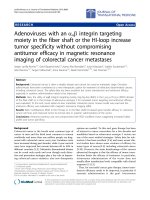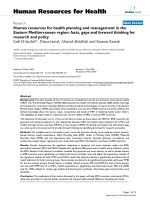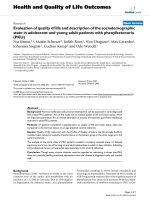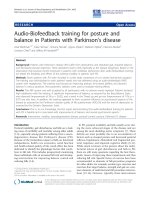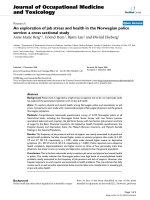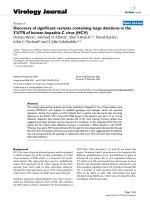báo cáo hóa học:" HIV-related restrictions on entry, residence and stay in the WHO European Region: a survey" ppt
Bạn đang xem bản rút gọn của tài liệu. Xem và tải ngay bản đầy đủ của tài liệu tại đây (301.43 KB, 6 trang )
RESEA R C H Open Access
HIV-related restrictions on entry, residence and
stay in the WHO European Region: a survey
Jeffrey V Lazarus
1,2*†
, Nadja Curth
2†
, Matthew Weait
3†
, Srdan Matic
1
Abstract
Background: Back in 1987, the World Health Organization (WHO) concluded that the screening of international
travellers was an ineffective way to prevent the spread of HIV. However, some countries still restrict the entrance
and/or residency of foreigners with an HIV infection. HIV-related travel restrictions have serious implications for
individual and public health, and violate internationally recognized human rights. In this study, we reviewed the
current situation reg arding HIV-related travel restrictions in the 53 countries of the WHO European Region.
Methods: We retrieved the country-specific information chiefly from the Global Database on HIV Related Travel
Restrictions at hivtravel.org. We simplified and standardized the database information to enable us to create an
overview and compare countries. Where data was outdated, unclear or contradictory, we contacted WHO HIV focal
points in the countries or appropriate non-governmental organizations. The United States Bureau of Consular
Affairs website was also used to confirm and complement these data.
Results: Our review revealed that there are no entry restrictions for people living with HIV in 51 countries in the
WHO European Region. In 11 countries, foreigners living with HIV applying for long-term stays will not be granted
a visa. These countries are: Andorra, Armenia, Cyprus (denies access for non-European Union citizens), Hungary,
Kazakhstan, Moldova, the Russian Federation, Tajikistan, Turkmenistan, Ukraine and Uzbekistan. In Uzbekistan, an
HIV-positive foreigner cannot even enter the country, and in Georgia, we were not able to determine whether
there were any HIV-related travel restrictions due to a lack of information.
Conclusions: In 32% of the countries in the European Region, either there are some kind of HIV-related travel
restrictions or we were unable to determine if such restrictions are in force. Most of these countries defend
restrictions as being justified by public health concerns. However, there is no evidence that denying HIV-positive
foreigners access to a country is effective in protecting public health. Governments should revise legislation on
HIV-related travel restrictions. In the meantime, a joint effort is needed to draw attention to the continuing
discrimination and stigmatization of people living with HIV that takes place in those European Region countries
where such laws and policies are still in force.
Background
We read the article, “ Fear of foreigners: HIV-related
restrictions on entry, stay and residence”[1], in this jour-
nal with great interest. I n their contribution to the
debate over HIV-related travel restrictions, Amon and
Todrys stress the urgency on this issue, which affects
not only the lives of people living with HIV (PLHIV) all
over the world, but also the wellbeing of the commu-
nities in which they live. HIV-related travel restrictions
not only violate the fundamental rights of PLHIV, but
they also impede HIV prevention, care and treatment
efforts among all people.
The United Nations Human Rights Committee has
stated, “Liberty of movement is an indispensable condi-
tion for the free develo pment of a person” [2]. Earlier,
the Office of the High Commissioner for Human Rights
stated that:
The [International] Covenant [on Civil and Political
Rights] does not recognize the right of aliens to
enter o r reside in the territory of a State party. It is
in principle a matter for the State to decide who it
will admit to its territory. However, in certain
* Correspondence:
† Contributed equally
1
WHO Regional Office for Europe, Copenhagen, Denmark
Lazarus et al. Journal of the International AIDS Society 2010, 13:2
/>© 2010 Lazarus et al; licensee BioMed Central Ltd. This is an Open Access article distributed under the t erms of the Creative Commons
Attribution License (http://creativecommons .org/licenses/by/2.0), which permits unrestr icted use, distribution, and reproduct ion in
any medium, provided the original work is properly cited.
circumstances an alien may enjoy the protection of
the Covenant even in relation to entry or residence,
for example, when considerations of non-discrimina-
tion, p rohibition of inhuman treatment and respect
for family life arise [3].
Governments do, of course, have the right to control
entry to their borders and have a certain margin of
appreciation t o justify differential treatment compatible
with international human rights law. But the measures
must pursue a legitimate aim and need to be propor-
tional to the achievement of this aim [4].
Back in 1987, the World Health Organization (WHO)
concluded t hat the screening of international travellers
was an ineffective way to preven t the spread of HIV [5].
In 2002, Member States of the WHO European Region
resolved “ to develop a suppo rtive social and legal envir-
onment for groups at risk, especially sex workers, and
for people living with HIV/AIDS and to fight social and
legal exclusion, including travel restrictions” [6].
Since then, travel restrictions connected with commu-
nicable diseases in general and HIV in particular have
often been discussed [7-9], including recently in con-
junction with the 2009 outbreak of influenza virus A
(H1N1). Together with international organizations, such
as the International AIDS Society (IAS) [10], t he Inter-
national Organization for Migration and the Joint Uni-
ted Nations Programme on HIV/AIDS (UNAIDS) [11],
Amon and Todrys emphasize how HIV-related travel
restrictions have serious implications for individual and
public health and violate internationally recognized
human rights.
This important discussion prompted us to review the
current situation in the 53 countries of the WHO Eur-
opean Region, given that restrictions on entry, residence
and stay a ffect a wide range of PLHIV, including not
only stude nts and employees, but also members of vul-
nerable groups, such as refugees, asylum seekers and
other migrants.
Methods
In this study, which we carried out in April and May
2009, our concern was to map formal entry and resi-
dence restrictions that required an HIV test or a medi-
cal certificate of HIV status. It should be noted that in
practice, however, some of the countries did not apply
the rules that were legally valid at this time. We also
reviewed whether people can be denied entry when
applying for long-term stay (but not residence) or be
deported if authorities obtain evidence of HIV infection.
To obt ain a valid, up-to-date overview of HIV-related
travel restrictions in the European Region, we collected
data from a variety of sources. We retrieved the infor-
mation chiefly from the Global D atabase on HIV
Related Travel Restrictions at hivtravel.org[12], an initia-
tive of the German AIDS Federation, the E uropean
AIDS Treatment Group (EATG) and the IAS. The infor-
mation in this database is based on replies to a struc-
tured self-administered questionnaire from German
embassies abroad and foreign embassies in Germany
between November 2007 and June 2008.
We simplified and standardized the database informa-
tion to enable us to create an overview and compare
countries. Where data was outdated, unclear or contra-
dictory, we searched the websites of foreign ministries
in the countries and contacted WHO HIV focal points
in the cou ntries or appropriate non-governmental orga-
nizations (NGOs), such as the Eurasian Harm Reduction
Network and the Hungarian Civil Liberties Union.
We also used the United States Bureau of Consular
Affairs website [13] to confirm and complement these
data. Most of the information provided by the focal
points and NGOs was clear, sufficient and based on
national laws and regulations. However, in some
instances, the information was vague, and several com-
munications were sometimes necessary to clarify unre-
solved questions.
Results
For 11 of the 53 countries (Armenia, Belarus, Bulgaria,
Cyprus,Georgia,Hungary,Israel,Moldova,Tajikistan,
Ukraine and Uzbekistan), publicly available information
did not provide a sufficient or clear picture of HIV-
related travel restrictions. In these cases, we contacted
focal points and NGOs, receiving replies from every
country except Israel.
The resulting information and our initial review of th e
hivtravel.org database revealed that there are no entry
restrictions for PLHIV in 51 countries (see Table S1,
Additional file 1 and Figure 1). In Uzbekistan, however,
the law mandates that visitors carry a certificate attest-
ing that they are not infected with HIV. Foreigners from
countries requiring visas to enter or stay in Uzbekista n
will not be issued a visa to enter the country if they are
found to be HIV positive. In Georgia, the situation fo r
PLHIV wishing to enter the country is uncertain due to
unclear information.
In 36 countries, there a re also no HIV-related restric-
tions f or long-term visits (see Fig ure 2). In Georgia, the
policy on long-term visits is unclear. In eight countries
(Belarus, Moldova, Poland, the Russian Federation, Taji-
kistan, Turkmenistan, Ukraine and Uzbekistan), an HIV
test is required for all foreigners wishing to stay for
more than three months. In three of these countries
(Republic of Moldova, the Russian Federation and Turk-
menistan), this requirement also applies to students and
employees. In the Russian Federation, an HIV test is not
required for citizens of countries in the Commonwealth
Lazarus et al. Journal of the International AIDS Society 2010, 13:2
/>Page 2 of 6
of Independent States, who do not need visas for long-
term stays.
Andorra will not grant residency or work permits to
PLHIV (See Figure 3). In Hungary, an HIV test is
required of a ll foreigners wishing to stay for more than
one year. In Kazakhstan, an HIV test is required for for-
eigners staying for more than 30 days. In Cyprus, people
who are not citizens of the European Union must pre-
sent an HIV test to apply for a work or study permit,
which will be denied if the test is positive. In Slovakia,
an HIV test is also required for foreigners applying for
residence or a work p ermit. In the German s tate of
Bavaria, an HIV test can be required for people staying
for more than 180 days, while in the states of Saxony
and New Brandenburg, there is mandatory HIV testing
for asylum seekers.
In Armenia, the situation for long-term visitors is
complex. A negative HIV certificate is required from all
foreigners applying for visas. Until 14 July 2009, foreign
PLHIV already in the country were subject to deporta-
tion. On that date, a new law came into force, specifying
that foreigners would not be deported if found to be
HIV positive. Yet a foreigner applying for a visa still has
to present a negative HIV test. Armenia is working to
change these regulations.
And f inally, while we did not find sufficient informa-
tion on requirements for long-term stays in Israel, there
are indication s that foreigners in general do not need to
Figure 1 Percentage of European Region countries with HIV-related entry restrictions.
Figure 2 Percentage of European Region countries with HIV-related residence restrictions.
Lazarus et al. Journal of the International AIDS Society 2010, 13:2
/>Page 3 of 6
present a certificate of HIV status, although an HIV test
is required for all migrant workers and for migrants
from regions where HIV is endemic. However, it is not
clear if a migrant can be denied access based on a posi-
tive HIV test.
Of the 17 countries requiring an HIV test or certifi-
cate for applying for long-term stays, 11 countries (69%)
will deny a foreigner holding a positive HIV test entry
into the country. In additi on to Cyprus, which denies
access t o non-EU citizens, these countries are Andorra,
Armenia, Hungary, Kazakhstan, Moldova, the Russian
Federation (for citizens outside the Commonwealth of
Independent States), Tajikistan, Turkmenistan, Ukraine
and Uzbekistan.
Discussion
Our research shows that only 36 out of 53 countries
have no travel restrictions of any kind for PLHIV. This
means that in 32% of the countries in the European
Region, either there are some kind of HIV-related travel
restrictions (as defined in this paper) or we were unable
to determine if such restrictions are in force.
Although most countries with HIV-related travel
restrictions defend them as being justified by public
health concerns, the WHO Regional Office for Europe
has explicitly rejected this claim [6]. Not only do HIV-
related travel restrictions tend to be ineff ective and lead
toafalsesenseofprotection-acountry’s nationals can
just as easily contract the virus abroad and spread it at
home, for example - but they also contribute to and
reinforce th e discrimination and stigmatization to which
PLHIV are subjected. Further, people facing restrictive
measures at entry may hide their status and avoid HIV
testing and even health care services in general. Further,
the European Union HIV/AIDS Civil Society Forum has
called for the elimination of all HIV-related travel
restrictions in Europe by 2010 [14].
The Office of the United N ations High Commissioner
for Human Rights and UNAIDS, for example, have
unequivocally stated that “ any restrictions on these
rights [to liberty of movement and choice of residence]
based on suspected or real HIV status alone, including
HIV screening of international travelers, are discrimina-
tory and cannot be justified by public health concerns”
[15] because while HIV is i nfectious, it cannot be trans-
mitted through casual contact [16]. Those countrie s
without HIV-related entry, stay, and residence restric-
tions have not reported any negative public health con-
sequences [17].
Additional considerations arise with respect to travel
within the 27 countries of the European Union because
free movement of people within the EU is one of its
founding principles, a principle acknowledged not only
in its founding and subsequent treaties, but also in the
European Convention of Human Rights. For example,
Council Directive 2004/38/EC [18] states that:
Without prejudice to the provisions on travel docu -
ments applicable to national border controls, all
Union citizens with a valid identity c ard or passport
shall have the right to leave t he territory of a
Member State to travel to another Member State
[Article 4.1].
And similarly:
Without prejudice to the provisions on travel docu -
ments applicable to national border controls,
Figure 3 Percentage of European Region countries with residence restrictions where a foreigner will not be granted a visa if found to
be HIV positive.
Lazarus et al. Journal of the International AIDS Society 2010, 13:2
/>Page 4 of 6
Member States shall grant Union citizens leave to
enter their territory with a valid identity card or
passport [Article 5.1].
The directive later notes that:
Subject to the provisions of this Chapter, Member
States may restrict the freedom of movement and
residence of Union citizens on grounds of public
policy, public security or public health. These
grounds shall not be invoked to serve economic
ends [Article 27.1].
However, it goes on to place narrow limits on public
health arguments for such restrictions:
The only diseases justifying measures restricting
freedom of movement shall be the diseases with epi-
demic potential as defined by the relevant instru-
ments of the World Health Organization and other
infectious diseases or conta gious parasitic diseases if
they are the subject of protection provisions applying
to nationals of the host Member State [Article 29.1].
For example, travel restrictions c an be used to limit
the spread of highly contagious diseases, such as cholera
or acute respiratory syndrome (SARS), but such mea-
sures tend to be short-term and are most l ikely not very
effective. Even in these cases, authorities must still con-
sider human rights and the broad social, economic and
public health c onsequences of initiating travel restric-
tions of any kind.
In general, WHO does not support travel restrictions
in relation to communicable diseases, and the recent
case of influenza A (H1N1) was no exception [19].
According to the International H ealth R egulations [20],
a bindi ng document signed by all WHO Member States,
national health measures for travellers must not be
more restrictive of international traffic, or more invasive
or intrusive to the indivi dual, than available alternatives
that provide an appropriate level of health protection. If
such measures are implemented, they should be justified
by scientific principles, available scientific evidence or
WHO advice. In the case o f HIV, there is no evidenc e
that denying HIV-positive foreigners access to a country
is effective in protecting public health.
Conclusion
In contrast to HIV, the highly contagious diseases that we
have mentioned have short incubation periods and are
transmitted through casual contact. While HIV transmis-
sion is mostly due to risk behaviours like sharing needles
or unsafe sex, these diseases are transmitted much more
readily, through droplets in the air or contaminated food
or water. In the light of these differences, as well as the
potential for discrimination and stig matization, the pub-
lic health justification for HIV- related travel r estrictions
is inadequate and even irrational.
Additional file 1: Table S1. Overview of travel restrictions in the
countries of the WHO European Region.
Click here for file
[ />S1.DOC ]
Author details
1
WHO Regional Office for Europe, Copenhagen, Denmark.
2
Department of
Public Health, Copenhagen University, Copenhagen, Denmark.
3
Faculty of
Lifelong Learning, Birkbeck College, London, UK.
Authors’ contributions
NC drafted the article based on an idea from JVL and SM. JVL fully revised
the first draft and MW reviewed and added additional material. NC fact
checked the changes. SM fully reviewed and edited the next draft. JVL and
MW addressed the reviewer’s comments. All authors read and approved the
final manuscript.
Competing interests
The authors declare that they have no competing interests.
Received: 16 July 2009
Accepted: 15 January 2010 Published: 15 January 2010
References
1. Amon J, Todrys K: Fear of foreigners: HIV-related restrictions on entry,
stay and residence. J Int AIDS Soc 2008, 11:8.
2. United Nations Human Rights Committee: General Comment No. 27 (67).
Freedom of movement (Art. 12 of the International Covenant on Economic,
Social and Cultural Rights) 1999 />6c76e1b8ee1710e380256824005a10a9?Opendocument, paragraph 1.
Accessed 31 May 2009.
3. Office of the High Commissioner for Human Rights: General Comment No.
15. The position of aliens under the Covenant on Civil and Political Rights
1986 />bc561aa81bc5d86ec12563ed004aaa1b?Opendocument, paragraph 5.
Accessed 11 November 2009.
4. Human Rights Watch: The Netherlands: Discrimination in the Name of
Integration: Migrants’ Rights under the Integration Abroad Act.http://
www.hrw.org/en/node/82373/section/1, Accessed 11 November 2009.
5. World Health Organization: Statement on screening of international
travellers for infection with Human Immunodeficiency Virus. 1988, WHO/
GPA/INF/88.3.
6. World Health Organization (WHO) Regional Office for Europe: Scaling up
the response to HIV/AIDS in the European Region of WHO EUR/RC52/R9.
/>Accessed 1 July 2009.
7. Border restrictions and HIV/AIDS: A public health policy disaster. AIDS
Health Promot Exch 1993, , 1: 12-13.
8. Morris K: USA lifts travel restrictions for HIV-positive people. Lancet Infect
Dis 2008, 8(9):532.
9. Plotkin B: Human rights and other provisions in the revised International
Health Regulations (2005). Public Health 2007, 121:840-845.
10. International AIDS Society (IAS): HIV-specific travel and residence
restrictions. IAS Policy Paper Geneva: IAS 2009 />Web/WebContent/File/ias_policy%20paper.pdf, Accessed 31 May 2009.
11. Joint United Nations Programme on HIV/AIDS (UNAIDS), International
Organization for Migration (IOM): UNAIDS/IOM Statement on HIV/AIDS-
related Travel Restrictions. Geneva: UNAIDS, IOM 2004 />jahia/webdav/site/myjahiasite/shared/shared/mainsite/activities/health/
UNAIDS_IOM_statement_travel_restrictions.pdf, Accessed 31 May 2009.
Lazarus et al. Journal of the International AIDS Society 2010, 13:2
/>Page 5 of 6
12. The Global Database on HIV-Related Travel Restrictions. http://www.
hivtravel.org, Accessed 31 May 2009.
13. United States Bureau of Consular Affairs: Travel.state.gov: country specific
information. />Accessed 31 May 2009.
14. EU HIV/AIDS Civil Society Forum: Call for a European response to remove
HIV specific travel restrictions in Europe by 2010. />Web/WebContentEATG/File/Call%20for%20European%20response%20to%
20remove%20HIV%20travel%20restrictions%20in%20Europe%20by%202010.
pdf, Accessed 11 November 2009.
15. Office of the United Nations High Commissioner for Human Rights and the
Joint United Nations Programme on HIV/AIDS: International Guidelines on
HIV/AIDS and Human Rights Geneva: Joint United Nations Programme on
HIV/AIDS (UNAIDS) 2006.
16. Madhok R, Gracie JA, Lowe GD, Forbes CD: Lack of HIV transmission by
casual contact. Lancet 1986, 328:863.
17. International Task Team on HIV-related Travel Restrictions: Denying entry,
stay and residence due to HIV status: Ten things you need to know.
/>travel_restrictions_English_WEB.pdf, Accessed 11 November 2009.
18. European Parliament, Council of the European Union: Corrigendum to
Directive 2004/38/EC of the European Parliament and of the Council of
29 April 2004 on the right of citizens of the Union and their family
members to move and reside freely within the territory of the Member
States amending Regulation (EEC). No 1612/68 and repealing Directives
64/221/EEC, 68/360/EEC, 72/194/EEC, 73/148/EEC, 75/34/EEC, 75/35/EEC,
90/364/EEC, 90/365/EEC and 93/96/EEC (OJ L 158, 30.4.2004). Official
Journal L 2004, 229(29/06/2004):35-48.
19. World Health Organization (WHO): Influenza A: frequently asked
questions: travel. />frequently_asked_questions/travel/en/index.html, Accessed 18 May 2009.
20. World Health Organization (WHO): International Health Regulations Geneva:
WHO, 2 2005, Article 43.
doi:10.1186/1758-2652-13-2
Cite this article as: Lazarus et al.: HIV-related restrictions on entry,
residence and stay in the WHO European Region: a survey. Journal of
the International AIDS Society 2010 13:2.
Publish with BioMed Central and every
scientist can read your work free of charge
"BioMed Central will be the most significant development for
disseminating the results of biomedical research in our lifetime."
Sir Paul Nurse, Cancer Research UK
Your research papers will be:
available free of charge to the entire biomedical community
peer reviewed and published immediately upon acceptance
cited in PubMed and archived on PubMed Central
yours — you keep the copyright
Submit your manuscript here:
/>BioMedcentral
Lazarus et al. Journal of the International AIDS Society 2010, 13:2
/>Page 6 of 6

